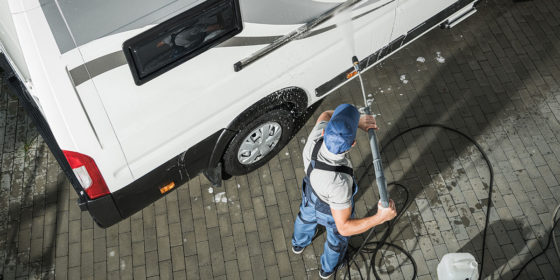8 Tips for Preparing Your RV for the Camping Season
4 min read
Spring isn’t far off, which means it’s time to think about getting your RV ready for the upcoming camping season. Before you hit the highway, you’ll need to de-winterize your unit and perform some RV spring maintenance. RVT has compiled a few tips to help you get your travel trailer, diesel pusher, toy hauler, or other RV ready for your summer adventures!
1) Clean and Inspect the Exterior of Your RV
Before you take your unit on the road, examine your windows, body, roof, and slide-out seams for signs of wear or water damage—remember to look inside and out—and apply new seals if needed. Inspect your hitch for damage and replace it if necessary. Wash the exterior of your unit with an RV-appropriate cleaner to freshen it up and get it road ready.
2) Examine Tires and Wheel Bearings
If you aren’t a year-round camper, your RV’s tires are sitting still for months at a time. Direct sunlight and winter weather can damage the rubber over time, leading to dry rot. Always inspect your tires before heading out; if you see small cracks, replace the tires. RV tires have a shelf life of around five to seven years. Checking your tire pressure is also important. Consult your manufacturer’s guide for the ideal tire pressure. For the most accurate reading, check the pressure when the tires are cold.
3) Check Your Cooling System and Engine
Check all fluid levels in your motorhome or tow vehicle, make sure all lights and controls are operational, and have your cooling system serviced before hitting the road. Replace or repair what’s necessary. Keep in mind, summer heat can cause strain on your engine, especially if you’re traveling in areas with a lot of elevation changes, so it’s important that your cooling system is in top condition.
Pro tip: rushing to get to your destination wastes gas and can overheat your engine, so take it easy on the journey.
4) Recertify Your Propane Tanks And Check Gas-Fired Appliances
Propane tanks need to be recertified every ten years. If yours has expired, you’ll need to replace it. Once you’ve checked and reinstalled your propane tanks, it’s time to check your gas-fired appliances by opening the gas line and turning them on. Make sure your hot water tank is full before you test it. If any of your propane appliances aren’t working, have them inspected by a certified RV service department. Any ignition problems or propane leaks should be handled by professionals.
5) Test Your Batteries
Check your engine and accessory batteries before you head out on the road. Make sure the connections are tight and batteries have been completely charged. If you need to replace any, avoid combining old and new batteries.
6) Flush Your Water Lines
After winterizing with RV antifreeze, you’ll need to flush out the system in the spring. Turn on the water pump and open all water faucets, inside and out. Let them run for a few minutes to get rid of any antifreeze. At the same time, check for any leaks in the water system. After flushing, the water should taste clean and fresh. If it doesn’t, try putting some baking soda into the drains and flush again until the water tastes clean.
7) Clean and Examine the Interior of Your RV
Carefully go through the interior of your RV and look for evidence of water damage, rodent activity, or insects, and make repairs, if needed. Turn on any non gas-fired appliances to make sure they are working. Air out your unit and clean the inside top to bottom, including fans, windows and screens.
8) Make Sure All Safety Equipment is Working
Check your fire extinguisher, smoke detector, and carbon monoxide detector to ensure all are in proper working order. Fire extinguishers typically last about fifteen years. If the handle is cracked or wobbly, replace the extinguisher. If you have an older, new-to-you unit and you don’t know when it was last replaced, consider getting a fresh one. Now is also a good time to refresh your first aid supplies.
We hope these tips are helpful as you prepare for the new camping season. If you’re uncomfortable performing maintenance on your RV yourself, an RV service provider near you will be happy to help. Keep in mind, some maintenance—such as repairing gas-fired appliances—should only be done by a professional. Happy camping!
If you’re looking for a new or used RV for the upcoming season, check out the latest units available on RVT.com.



